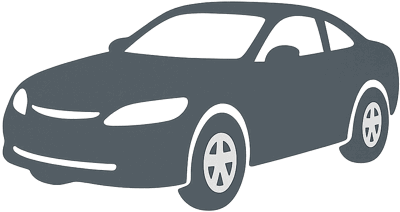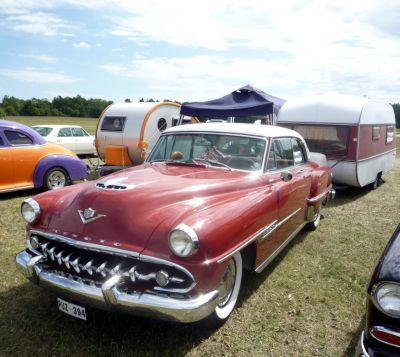 1954 DeSoto Firedome Convertible Coupe (facelift 1954) Dimensions, Size & Specs
1954 DeSoto Firedome Convertible Coupe (facelift 1954) Dimensions, Size & SpecsMeasurements of the 1954 DeSoto Firedome Convertible Coupe, engineered for optimal performance and comfort
| Dimensions | |
|---|---|
| Length: | 5448 mm214.5 in17.9 ft |
| Width: | 1969 mm77.5 in6.5 ft |
| Height: | 1632 mm64.3 in5.4 ft |
| Ground Clearance: | 178 mm7.0 in0.6 ft |
The 1954 DeSoto Firedome Convertible Coupe represents a quintessential example of mid-century American automotive design, produced during the 1953-1954 period. This generation of the Firedome combined elegance and power with its cabriolet and coupe body styles, appealing to enthusiasts of luxurious yet performance-oriented vehicles.
Measuring 5448 mm (214.4 inches) in length, the Firedome Convertible Coupe displays a commanding presence on the road. Its width of 1969 mm (77.5 inches) provides a spacious and stable stance, complementing its classic proportions. The vehicle's height stands at 1632 mm (64.3 inches), striking a balance between a sporty profile and comfortable interior headroom. Ground clearance is maintained at 178 mm (7.0 inches), suitable for the ride comfort and drivability expected from cars of that era.
These dimensions reflect the Firedome's status as a full-sized automobile during the early 1950s, where design emphasized bold styling cues and passenger comfort. Its sizeable footprint and balanced height-width ratio underscore its grand touring capabilities while promising a smooth ride.
As a classic cabriolet, the Firedome Convertible Coupe offered open-top motoring with the refined aesthetic typical of the 1950s American automotive industry. The facelift in 1954 refined styling details, making this model generation a sought-after collector’s item today. Overall, the 1954 DeSoto Firedome Convertible Coupe stands out as a symbol of post-war American automotive innovation, blending noteworthy size dimensions with iconic design.
Discover the standout features that make the 1954 DeSoto Firedome Convertible Coupe a leader in its class
Have a question? Please check our knowledgebase first.
The 1954 DeSoto Firedome Convertible Coupe (facelift) features an overall length of 5448 mm (214.4 inches), making it a fairly long vehicle typical of its era. Its width measures 1969 mm (77.5 inches), providing a roomy cabin and substantial road presence. The height stands at 1632 mm (64.3 inches), which accounts for its classic convertible coupe silhouette and offers good headroom. These dimensions contribute to a spacious interior and a stately exterior appearance that was characteristic of mid-1950s American cars.
The 1954 DeSoto Firedome Convertible Coupe has a ground clearance of 178 mm (7 inches). This moderate clearance is sufficient for smooth urban and highway driving typical of its time, allowing it to handle minor road obstacles without difficulty. However, the relatively low ride height means drivers should be cautious when parking on uneven surfaces, speed bumps, or steep driveways to avoid scraping the undercarriage. Overall, the ground clearance balances a low, stylish stance with practical usability.
With a height of 1632 mm (64.3 inches), a width of 1969 mm (77.5 inches), and a length of 5448 mm (214.4 inches), the 1954 DeSoto Firedome Convertible Coupe is relatively large by today's standards. Standard residential garage widths are typically around 2.4 to 2.7 meters (8 to 9 feet), and standard garage door heights around 2.1 to 2.3 meters (7 to 7.5 feet), so the car’s height and width fit comfortably within these dimensions. However, its impressive length of about 5.45 meters (17.9 feet) means it will occupy most of the garage depth, leaving limited space for storage or maneuvering around the vehicle inside the garage. Overall, the car fits but requires a fairly deep garage space.
Compared to the earlier DeSoto Firedome models produced before the 1954 facelift, the 1954 Convertible Coupe maintained similar external dimensions but featured evolutionary styling updates. The length of 5448 mm (214.4 inches) and width of 1969 mm (77.5 inches) remained largely consistent, preserving the spacious cabin and road presence. The facelift introduced refreshed design elements including chrome trim and grille changes rather than major size alterations, keeping the car’s footprint familiar to Drivers. Dimensionally, the differences are subtle but the updated styling gave it a more modern and refined look relative to its predecessor.
The 1954 DeSoto Firedome Convertible Coupe offers an expansive interior space reflective of its 1969 mm (77.5 inches) width and 1632 mm (64.3 inches) height, providing comfortable seating for four passengers in coupe or cabriolet format. Its roomy cabin features wide bench seats typical of 1950s American luxury cars, which allow for generous legroom and headroom despite the convertible roof's presence. The design emphasizes passenger comfort with plush upholstery and an open-air experience in the convertible variant. While not measured in specific liters or cubic centimeters, the interior volume caters well to long drives and social cruising in style.
In the 1950s, the DeSoto Firedome Convertible Coupe competed against other large American full-size cars like the Chevrolet Bel Air, Ford Crestline, and Chrysler New Yorker. With a length of 5448 mm (214.4 inches), it was on the longer side, implying a focus on spaciousness and presence. Its width at 1969 mm (77.5 inches) was also on par or slightly wider than many competitors, which typically ranged from 1880 mm to 1960 mm (74 to 77 inches). Height at 1632 mm (64.3 inches) allowed it to maintain a balanced profile – neither too tall nor too low compared to rivals. Overall, the Firedome provided a competitive size offering with a stately and roomy driving experience that aligned well with the preferences of American buyers seeking luxury and space.
Although specific weight data for the 1954 Firedome Convertible Coupe isn’t provided here, typical full-size 1950s American cars like the Firedome weighed between 1700 to 2000 kilograms (approximately 3750 to 4400 pounds). This substantial weight contributed to a strong, stable ride with a sensation of solidity on the road. However, the heavy mass also required powerful engines to maintain good acceleration and could affect fuel economy and maneuverability compared to smaller vehicles. Drivers could expect a smooth and comfortable driving experience with less harshness over bumps, thanks to the car’s mass and suspension tuning typical of the era.
The 1954 DeSoto Firedome Convertible Coupe was offered mainly in two body styles: Cabriolet (convertible) and Coupe. Both share the same exterior dimensions—length of 5448 mm, width of 1969 mm, and height of 1632 mm—but the convertible has a folding soft top replacing the fixed roof, providing open-air driving pleasures. This design choice slightly affects structural rigidity but lends the car a more elegant, leisurely image. The coupe features a fixed roof for a quieter cabin and often better insulation. Both body styles emphasized chrome trim and styling cues characteristic of the 1954 facelift.
The 1954 DeSoto Firedome Convertible Coupe was typically equipped with the iconic 276 cubic inch (4.5-liter) HEMI V8 engine, a hallmark of the Firedome line. This motor produced around 160 to 185 horsepower depending on tuning and emissions standards, delivering strong and smooth performance for its time. Accompanied by a three-speed manual or optional automatic transmission, the car was competitive in acceleration and cruising comfort. These performance attributes paired well with the car’s full-size stature and relatively heavy weight, creating an experience emphasizing power, stability, and slick highway driving rather than sporty agility.
The 1954 DeSoto Firedome Convertible Coupe facelift holds a special place in classic car culture due to its distinctive 1950s styling, powerful HEMI engine, and limited production run as the DeSoto marque was discontinued soon after. Its combination of size, luxury, and top-down cruising appeal attracts collectors who value mid-century American automotive history. Today, it is cherished for its aesthetic charm, classic engineering, and place within the final years of DeSoto’s legacy. Restored models often appear in vintage car shows, symbolizing an era of bold design and automotive optimism.
Discover similar sized cars.

| Production: | 1953-1954 |
|---|---|
| Model Year: | 1954 |
| Length: | 5448 mm214.5 in |
| Width: | 1969 mm77.5 in |
| Height: | 1632 mm64.3 in |

| Production: | 1953-1954 |
|---|---|
| Model Year: | 1954 |
| Length: | 5448 mm214.5 in |
| Width: | 1969 mm77.5 in |
| Height: | 1632 mm64.3 in |
